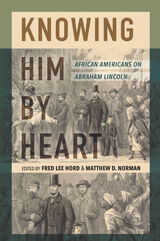5 books about Westwater, Lynn Lara
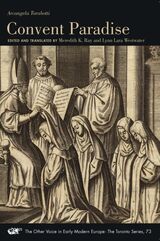
Convent Paradise
Arcangela Tarabotti
Iter Press, 2020
The radical Venetian writer Arcangela Tarabotti (1604–1652), compelled against her will to become a nun, is well known for her scathing attacks on patriarchal institutions for forcing women into convents. Convent Paradise (1643), Tarabotti’s first published work, instead invites the reader into the cloister to experience not only the trials of enclosure, but also its spiritual joys. In stark contrast to her other works, Convent Paradise aims to celebrate the religious culture that colored every aspect of Tarabotti’s experience as a seventeenth-century Venetian and a nun. At the same time, this nuanced exploration of monastic life conveys a markedly feminist spirituality. Tarabotti’s meditative portrait of the convent enriches our understanding of her own life and writing, while also providing a window into a spiritual destiny shared by thousands of early modern women.
The Other Voice in Early Modern Europe - The Toronto Series volume 73
The Other Voice in Early Modern Europe - The Toronto Series volume 73
[more]
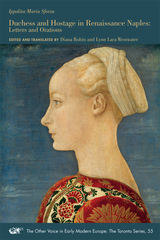
Duchess and Hostage in Renaissance Naples
Letters and Orations
Ippolita Maria Sforza
Iter Press, 2017
This volume presents in translation 100 previously unknown letters of Ippolita Maria Sforza (1445–1488), daughter of the Duke of Milan, who was sent at age twenty to marry the son of the infamously brutal King Ferrante of Naples. Sforza’s letters display the adroit diplomacy she used to strengthen the alliance between Milan and Naples, then the two most powerful states in Italy, amid such grave crises as her brother’s assassination in Milan and the Turkish invasion of Otranto. Still, Ippolita lived as a hostage at the Neapolitan court, subject not only to the threat of foreign invasion but also to her husband’s well-known sexual adventures and her father-in-law’s ruthlessness. Soon after Ippolita’s mysterious death in 1488, the fraught Naples-Milan alliance collapsed.
[more]
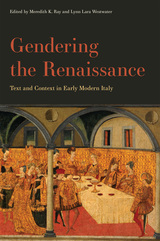
Gendering the Renaissance
Text and Context in Early Modern Italy
Meredith K. Ray
University of Delaware Press, 2023
The essays in this volume revisit the Italian Renaissance to rethink spaces thought to be defined and certain: from the social spaces of convent, court, or home, to the literary spaces of established genres such as religious plays or epic poetry. Repopulating these spaces with the women who occupied them but have often been elided in the historical record, the essays also remind us to ask what might obscure our view of texts and archives, what has remained marginal in the texts and contexts of early modern Italy and why. The contributors, suggesting new ways of interrogating gendered discourses of genre, identities, and sanctity, offer a complex picture of gender in early modern Italian literature and culture. Read in dialogue with one another, their pieces provide a fascinating survey of currents in gender studies and early modern Italian studies and point to exciting future directions in these fields.
[more]
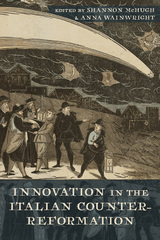
Innovation in the Italian Counter-Reformation
Shannon McHugh
University of Delaware Press, 2011
The enduring "black legend" of the Italian Counter-Reformation, which has held sway in both scholarly and popular culture, maintains that the Council of Trent ushered in a cultural dark age in Italy, snuffing out the spectacular creative production of the Renaissance. As a result, the decades following Trent have been mostly overlooked in Italian literary studies, in particular. The thirteen essays of Innovation in the Italian Counter-Reformation present a radical reconsideration of literary production in post-Tridentine Italy. With particular attention to the much-maligned tradition of spiritual literature, the volume’s contributors weave literary analysis together with religion, theater, art, music, science, and gender to demonstrate that the literature of this period not only merits study but is positively innovative. Contributors include such renowned critics as Virginia Cox and Amedeo Quondam, two of the leading scholars on the Italian Counter-Reformation.
Published by University of Delaware Press. Distributed worldwide by Rutgers University Press.
Published by University of Delaware Press. Distributed worldwide by Rutgers University Press.
[more]
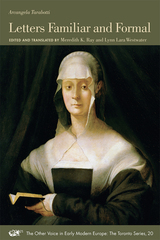
Letters Familiar and Formal
Arcangela Tarabotti
Iter Press, 2012
Coerced into taking the veil, Venetian writer Arcangela Tarabotti (1604–1652) spent her life protesting the practice of forcing girls into convents. Her fearless defense of women and attacks on patriarchal Venetian society earned her renown and access to the presses. Her publications, however, invited constant controversy. Tarabotti published her Letters Familiar and Formal to protect and enhance her literary reputation while also chronicling contemporary literary society and material existence in an early modern convent. The Letters flaunted Tarabotti’s literary accomplishments, humiliated her critics, and advertised her powerful network of allies in Northern Italy and France. The Letters document how Tarabotti established herself as one of the most forceful proponents for women’s self-determination in early modern Europe.
[more]
READERS
Browse our collection.
PUBLISHERS
See BiblioVault's publisher services.
STUDENT SERVICES
Files for college accessibility offices.
UChicago Accessibility Resources
home | accessibility | search | about | contact us
BiblioVault ® 2001 - 2025
The University of Chicago Press






